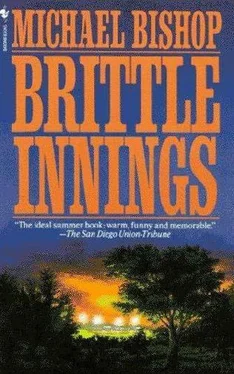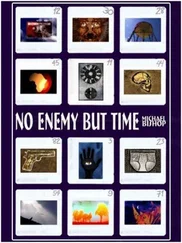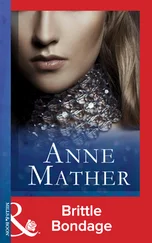Bottom of an inning, pretty far along. Feels like we’ve played a week. Otter Point two, Tenkiller zero. Except for the screaming wind, my dream’s silent. Guys open their mouths, but nothing comes out. I can’t tell if the wind’s drowning our voices or floating overhead like piano notes at an old Buster Keaton flick.
After a while, I seem to be alone. I’ve got teammates, but shrouds of fog have swallowed them. They’re like ghosts in fuzzy straitjackets, I’m the only Red Stix player with a clear outline or any freedom of movement, the only Red Stix player acting fired up, but I’m… well, I’m scared.
When I move, my spikes strike fire-like wading through an ankle-high forest of Fourth of July sparklers. The airfield is a big checkerboard of holey steel mats. The engineers on Umnak have locked the mats together over the tundra as a runway for patched-up Flying Fortresses and Liberators. In newsreels, it’s called Marsden matting.
From that point on, every batted ball comes my way, every chance. Grounders skip at me like lopsided rocks. Pop-ups and liners are worse. Every time I dive or try to set myself, I snag my spikes in the grid and fall. The mats’ edges slice me up. My hands bleed, my knees look like tomato pulp.
C-c-come on, you g-guys! I yell. Ya g-g-gotta h-help me! The wind blows my words to Siberia. I only hear them because I yelled them into the godawful williwaw.
Hours later, I get the inning’s last out and hobble in for my own at bats. The other Red Stix have vanished. I’ve got to bring us back from what looks like sure defeat-the Umnak bunch must’ve scored a dozen times in their at bat-but the cold’s begun to gnaw into me. My fingers feel carrot-stick brittle. Two or three snap off when I pick up my bat.
I try to dig in against the Otter Point pitcher anyway. He jams me with an inside curve. The ball rotates in like a chunk of packed ice. When I foul it, mostly to protect myself, my thumb shatters. Now I’m holding the bat with one finger and the heel of my hand. How can I drive the ball even if I make contact? The outlook isn’t brilliant. I seem to fall apart the piecemeal way icebergs do. D-D-Daddy! I yell.
The Otter Point pitcher vanishes. So do the guys in Army-green parkas and gutta-percha boots behind him. Just like the Red Stix, gone. I stand at the plate, a perforated steel grid at the end of a steel runway. The runway looks like an ocean, an ocean of Marsden matting. It laps at the foothills of a squat rampart of mountains.
An airplane appears in a notch of the mountains. Its wings rock in the fog as it drops toward the field. A P-40 Warhawk, like the planes flown by Chenault and the Flying Tigers, tiger jaws painted on its snout. It comes straight at me. Behind the P-40, lightning splits the sky. Zigzagging fiery snakes of lightning. A thunderclap bounces the runway’s long steel gridwork, the first thing besides the wind I’ve really heard. More thunderclaps. They back up on one another and blend into one flat murmuring BOOOOM! The landing strip buckles in waves. If the P-40 doesn’t plow me under, the mats will hurl me down and stamp me like a waffle. But I freeze where I stand. The Warhawk’s pilot doesn’t drop his landing gear or try to land. He blitzes toward me a few feet above the steel plates, ahead of the crest of their buckle. If he won’t pull up, his propellers will dice me for sure.
Then I see the pilot in the cockpit. His face belongs to my father, Richard Oconostota Boles, but it’s a twisted version of the face I remember. His eyes bulge. His lips sneer. His nose lies flat, like a second-rate pug’s. Just before he yanks back on his joystick and goes roaring away toward the sea, he gives me a wink; a wink, for Christ’s sake.
Then the last running wave of the Marsden grid drops toward me, clattering. I cross my arms over my head in a stupid attempt to keep the panels from crushing me. The background keen of the wind seems a fit sort of white noise to what’s happening to me. I still can’t tell if its keening scours my mouth or comes from it, but so what? It suits our loss. Also, my daddy winked.
I jerked awake. The clicking of the rails echoed in my chest: clickety-clack, dickety-clack. Life meant more than baseball. The look on Daddy’s face rushing toward me in that P-40 was a look he’d really given me once, right down to the wink. Sitting there, I dredged up that old memory, the whole lousy business.
When I was thirteen, early one A.M., Richard Oconostota Boles and the former Laurel Helvig shouted and scraped chairs around. Again. I’d have to remap the living room in my head to get to the John without stubbing a toe. The shouting never let up. The shouts smeared into an angry howl. Sofa legs scraped, chair legs tap-danced.
Usually when my folks argued, at some point the noise level dropped off. A breather. Not this time. The din got so loud I wondered if they’d called in a few pals to help them argue. Then, atop the raised voices, I heard a storm of flaps and soft collisions-the noise you’d probably get if you set up a huge fan at one end of Sparrow Alley. Had Daddy released a bunch of bats in the front room?
“ Tear up another one, Dickie, and I’ll kill you! ”
“ Try it! Jes try it! ”
My leg’d gone to sleep, but I limped into the front room to see the row firsthand. I hoped just seeing me would shame my parents into making up.
But I walked into a holy mess. Daddy’d been playing Jack the Ripper with Mama’s Life magazines. Black-and-white photos of Hitler, Shirley Temple, Lou Gehrig, and so on shingled the floor. Bedsheet pages. Daddy’d torn them out and thrown them all over. One teetered on a lampshade. Marian Anderson at the Lincoln Memorial dangled from between a pair of Venetian-blind slats. I took in every detail because the room looked like a hand grenade’d deranged it.
“See there,” Mama said. “You’ve done woke up Danny.”
“Get out of here!” Daddy yelled. “Go back to bed!”
I stood there, in my too-short pajama bottoms, and Daddy hurled a rolled-up magazine at me. It opened out and slid to rest at my feet. All the coverless copies of Life lay strewn about like stepping-stones to a loony bin.
“Yell at me if you like!” Mama said. “Go ahead! But leave your son be!”
“Mine, is he? Look at him. He don’t favor me. He don’t favor me a bit.”
“What’s that supposed to mean?”
“Danny don’t look, or do, like I do. Moren likely, some two-bit smoothie planted the boy while I was over to Tahlequah trying to make some dough.”
“Filth! An adult’d be ashamed to say it.”
“I am ashamed. My son aint my son. My wife let somebody else spike her.” Daddy’s high pink color told his drunkenness.
Mama cried, “Lousy redskin scum!” and started for him. A Life squirted out from under her. She toppled before she could begin flailing away. Daddy caught her, but yanked her sideways and dumped her on the sofa like a potato sack. She made for him again, cursing and wailing. But Daddy seemed an even worse monster, the way he’d insulted us.
I charged, nearly slipping on a photo page. Daddy held me off with one hand. “Lousy redskin scum!” I said. A curse good enough for Mama was fine for me. I started to curse him again when he chopped me in the throat with his hand.
I crashed. It felt like he’d knocked my head off. If I looked back, I’d see my body jumping around like a neck-wrung chicken’s. I wanted to scream, but couldn’t even gargle.
Daddy’s bloated face came down for a look-see. “He don’t favor me, Laurel. And he don’t do like I do, neither.”
“Baseball,” Mama said from the sofa. “You taught him how to play. He does that the way you do.”
Читать дальше












